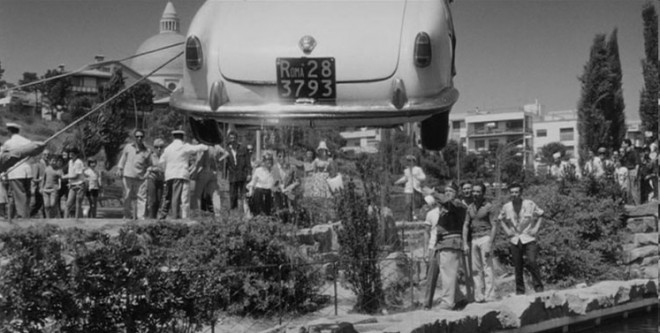A Chekhovian tragicomedy, Gleb Panfilov’s Tema, co-written by Panfilov and Aleksandr Chervinsky, follows Moscowite Kim Esenin, a popular though increasingly superficial and “conformist” playwright, back to Vladimir, his hometown, where he anticipates relaxation and refreshment. On this trip he ruminates on the source of his artistic inspiration: the area’s landscape, at this point whited out by snow. Indeed, an extreme long-shot finds Kim, outside the car, a mere speck against two vast continents: the snow-covered ground and the faintly gray sky. The image is correlative to this melodramatic thought of Kim’s: “I’ve wasted my life.” No; but his plays aren’t what they used to be. Neither are his nerves. When he phones his ex-wife, he learns that their son has dropped out of university. With this, he feels, there’s no hope that the boy will become a successful playwright and thereby extend his own success.
In his mid-fifties, Kim is balding, temperamental and self-involved. “I talk about love,” he admits, “but I love only myself.” Even this admission of self-involvement is, rather than penetrating self-analysis, superficial—an instance of Kim’s self-involvement. Panfilov underscores this characteristic of Kim’s by including in his role frequent—and frequently funny—voiceover comments and reflections. The humor, though, comes mostly, inadvertently, at his own expense. Altogether, Kim is a most engaging egotist.
Now, suddenly, a potential new muse appears before him: Sasha, a younger museum guide who reappears, as if by magic, at the home where he is staying with friend and fellow playwright Igor and doting student-disciple Svetlana.
The dinner scene and its immediate aftermath is the most riotously funny passage I have seen in a Soviet—or, for that matter, Russian—film. At table, Kim laments self-pityingly that he will never write anything of value, to which Sasha, who is familiar with his work, agrees rather than reassures him. Kim thanks Sasha for telling him the truth, but one cannot find the line between his cover-up of acute embarrassment and his bitter sarcasm. Kim explodes; Svetlana explodes—and the two of them join for an impromptu dance: the most hilarious dance I’ve seen in film since Joan Davis and Lou Costello “danced” together in Hold That Ghost (Arthur Lubin, 1941).
Incredibly, Kim fantasizes that Sasha has fallen in love with him and sends Svetlana packing. Poor Kim! He is also convinced that Sasha will “save” him; but Sasha’s private life, it turns out, is racked with sadness. It is she who needs “saving.”
All the shots in this film are beautifully conceived, many of them are deeply mysterious, and the acting is outstanding, especially that of Mikhail Ulyanov as Kim and Inna Churikova, Panfilov’s wife, as Sasha—although Churikova’s very dramatic false eyelashes are ridiculous.
Only perestroika ended the Soviet suppression of this brilliant film. To what did the Soviet censors object? Who knows. Perhaps Sasha’s love affair with a Jewish gravedigger, Andrei, or Andrei’s intention to exit the Soviet Union for Israel or the U.S. Or Kim’s overall dissatisfaction with his life despite his “success,” and what this may imply about Soviet society and the Soviet system. As I said: Who knows.
Best film prize, international critics’ prize, Berlin.
B(U)Y THE BOOK
MY BOOK, A Short Chronology of World Cinema, IS CURRENTLY AVAILABLE FROM THE SANDS FILMS CINEMA CLUB IN LONDON. USING EITHER OF THE LINKS BELOW, ACCESS THE ADVERTISEMENT FOR THIS BOOK, FROM WHICH YOU CAN ORDER ONE OR MORE COPIES OF IT. THANKS.
